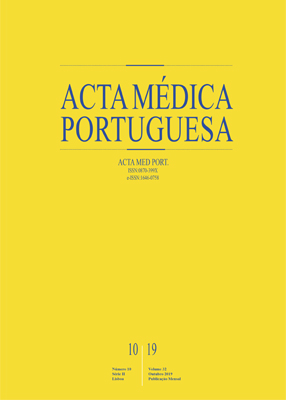Quality of Sleep among Portuguese Anaesthesiologists: A Cross-Sectional Study
DOI:
https://doi.org/10.20344/amp.11468Keywords:
Anesthesiologists, Anesthesiology, Disorders of Excessive Somnolence, Portugal, Sleep, Sleep Deprivation, Sleep Wake DisordersAbstract
Introduction: Sleeping is essential to maintain proper relationships with others, keep alertness, and execute responsibilities, among many other functions. In the medical profession, there are several studies linking sleep deprivation with a decrease in responsiveness, cognition and attention. With this study we intended to characterize the sleep pattern of Portuguese anaesthesiologists and identify independent factors associated with sleep quality in this population.
Material and Methods: An observational, cross-sectional study of senior and resident anesthesiologists working in Portugal was carried out through an online questionnaire. Individuals working exclusively in intensive care units, emergency departments or with previously diagnosed sleep disorders were excluded. Socio-demographic data, Pittsburgh Sleep Quality Index, Epworth Sleepiness Scale and Perceived Stress Scale were applied. Statistical significance was assessed using the Mann-Whitney test and the chi-square test. A multivariable analysis was performed to examine the association between the Pittsburgh Sleep Quality Index and certain variables.
Results: Among 256 respondents, 46.1% reported “poor” quality of sleep (Pittsburgh Sleep Quality Index > 5). Within these individuals, 77.1% slept less than 7 hours per night (p < 0.001). Excessive daytime sleepiness (Epworth Sleepiness Scale > 10) was present in 41.0% of the sample, and the median Perceived Stress Scale score was 17.0. The independent factors associated with worse quality of
sleep were the number of working hours/week (OR 1.03, 95% CI 1,01 to 1,06), perceived stress (OR 1.18, 95% CI 1.11 to 1.26), taking sleep medication (OR 14.72, 95% CI 5.55 to 39.08), and sleep hours/night (OR 0.25, 95% CI 0.15 to 0.42).
Discussion: This fraction of Portuguese anaesthesiologists presented a poorer quality of sleep, with excessive daytime somnolence, perceived stress and higher sedative use compared to previously studied populations.
Conclusion: Our study characterizes sleep patterns and identifies potential risk factors linked to sleep disturbances in a sample of Portuguese anaesthesiologists. Government and institutional policies can endorse sleep hygiene practices and habits, promoting healthier working environments.
Downloads
Downloads
Published
How to Cite
Issue
Section
License
All the articles published in the AMP are open access and comply with the requirements of funding agencies or academic institutions. The AMP is governed by the terms of the Creative Commons ‘Attribution – Non-Commercial Use - (CC-BY-NC)’ license, regarding the use by third parties.
It is the author’s responsibility to obtain approval for the reproduction of figures, tables, etc. from other publications.
Upon acceptance of an article for publication, the authors will be asked to complete the ICMJE “Copyright Liability and Copyright Sharing Statement “(http://www.actamedicaportuguesa.com/info/AMP-NormasPublicacao.pdf) and the “Declaration of Potential Conflicts of Interest” (http:// www.icmje.org/conflicts-of-interest). An e-mail will be sent to the corresponding author to acknowledge receipt of the manuscript.
After publication, the authors are authorised to make their articles available in repositories of their institutions of origin, as long as they always mention where they were published and according to the Creative Commons license.









